Created via billing
The information about the user created via billing is grouped in the following tabs:
User – contains general information about the user from the customer billing system.
Cameras – lists cameras that are accessible to the user.
Intercoms – lists intercoms that are available to the user.
Sub-users – additional users created by this user. This Functionality is available if the user has relevant permissions.
Billing Events – presents a billing event log of the user.
Access Settings – configurable access levels to the system functionality.
Analytics – licences for the user. The functionality is available when the user has licences.
On each tab, at the top of the page, the following general user information is provided:
User ID
Username
Login
Creation date
Selecting the Log in as User button opens a new browser tab and logs you into the web client under the user's credentials.
Selecting Synchronize cameras forces the synchronization of system settings and camera availability settings in the administrator interface with camera settings in user environments (the Desktop app, web interface, the mobile app).
The User tab
The User tab contains general information about the user from the customer's billing system.
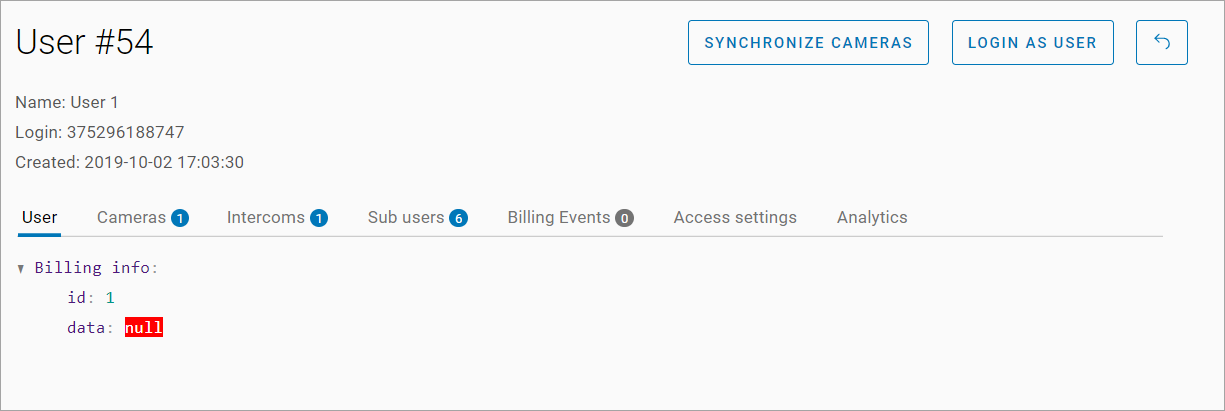
The User tab
Data isn’t editable. Data is retrieved from the customer billing system.
The Cameras tab
The Cameras tab displays the cameras that are accessible to the user.
The list only includes cameras that are accessible to the current system administrator.
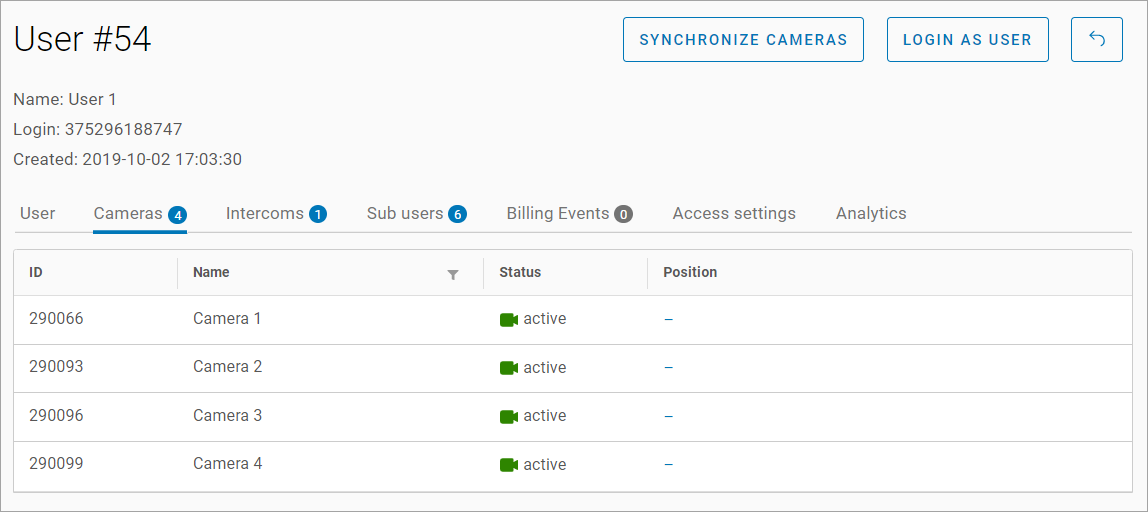
The Cameras tab
The tab displays a table with the following fields:
ID – a camera ID.
Name – a camera name.
Status – a camera status. Possible values: active, partially active, inactive, empty.
Location – a camera location (filled in when the customer address system is used). Selecting it navigates to the camera profile on the General data tab.
Data in the table isn’t editable.
The Intercoms tab
The Intercoms tab displays a list of intercoms available to the user.
Intercom is linked to a user from within the intercom detail card on the Apartments tab.
.png?inst-v=b63742cc-00c9-4c22-96cb-e64d375db7d7)
The Intercoms tab
The tab features the following information:
Name – an intercom name.
Address – an intercom address.
Department – an entrance where the intercom is installed.
Apartment – an apartment number the user is associated with.
Keys – keys associated with the user.
Created at – an intercom creation date.
Data in the table isn’t editable.
Selecting a row navigates to the intercom card on the General data tab.
The Sub-users tab
The Sub-users tab displays users created by the current user in a VMS user interface.
Sub-users are created in a VMS user interface by a different user with the relevant permissions.
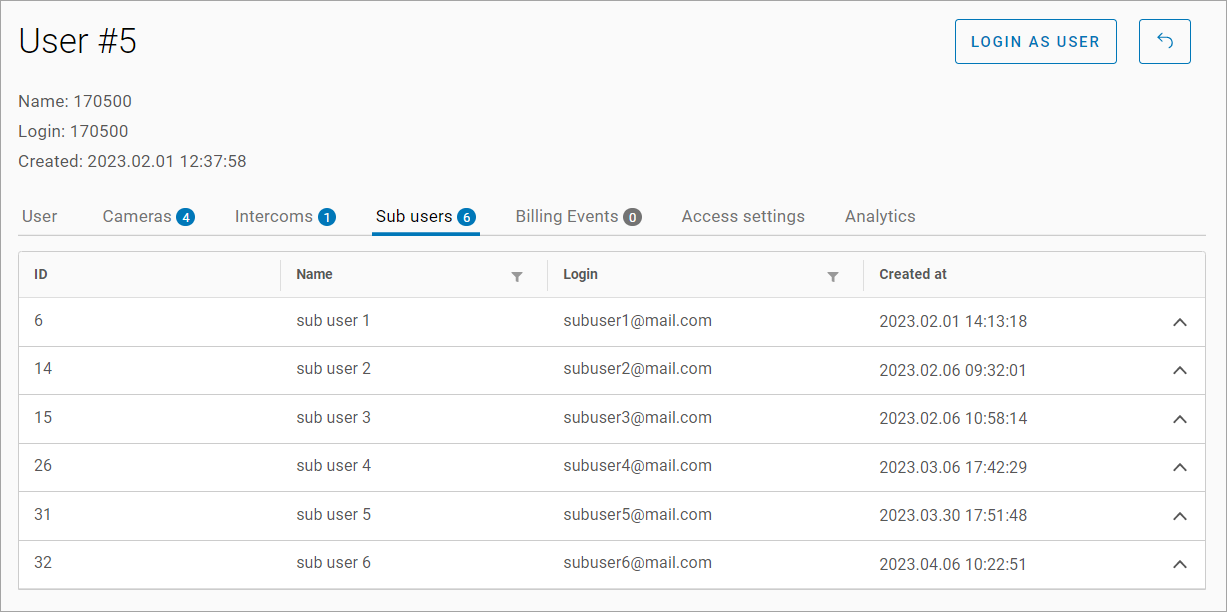
The Sub users tab
The tab displays a table with the following fields:
ID – a sub-user ID.
Name – a sub username.
Login – a sub-user login.
Created at – a creation date.
Sub-user permissions are editable.
From within the permission settings related to the Analytics module, the subuser is only shown permissions based on the licensing levels available to the user who created them.
When a user is deleted, all associated subusers are also automatically deleted.
When the user is deleted, all associated events, including their logs and the logs of any linked subusers, will be permanently removed after a period of 30 days.
The Billing Events tab
The Billing Events tab displays user events received from the customer billing system.
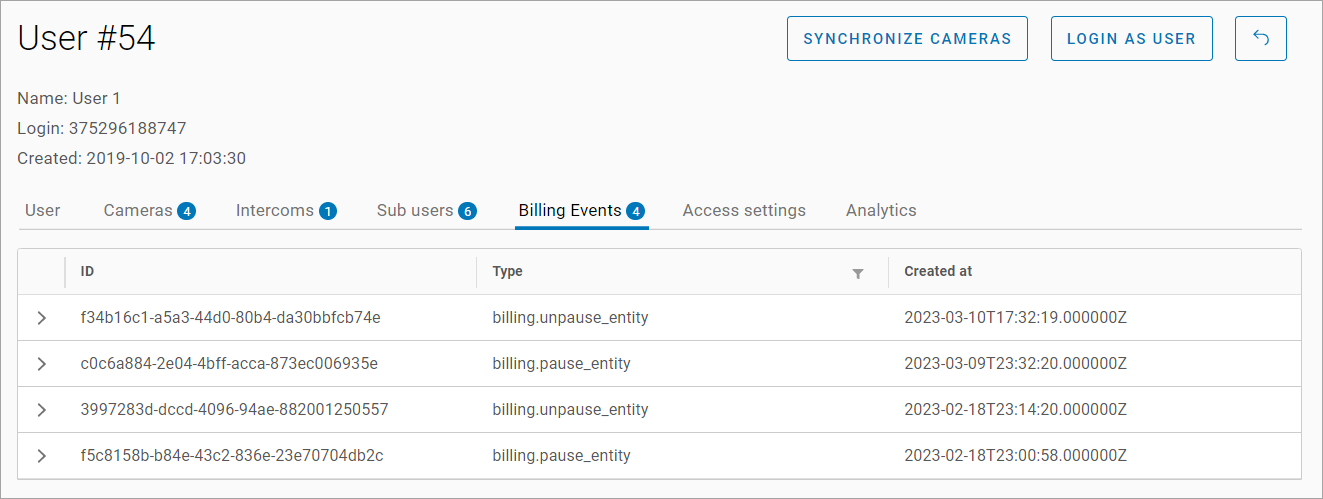
The Billing Events tab
The tab displays a table with the following fields:
ID – a request ID.
Type – a request type:
billing.new_entity, Billing. New entity.
billing.pause_entity, Billing. Pause entity.
billing.unpause_entity, Billing. Unpause entity.
billing.terminate_entity, Billing. Terminate entity.
billing.create_location, Billing. Create location.
billing.create_location_unknown_csa, Billing. Failed to create location.
billing.delete_location, Billing. Delete location.
billing.update_login, Billing. Update login.
billing.new_camera, Billing. New camera.
billing.attach_camera, Billing. Attach camera.
billing.attach_camera_unknown_csa, Billing. Failed to attach camera.
billing.detach_camera, Billing. Detach camera.
billing.unknown_type, Billing. Unknown type.
billing.update_password, Billing. Update password.
Created at – a creation date.
Data in the table isn’t editable.
The Access settings tab
The Access settings tab is used to configure access rights for the current user.
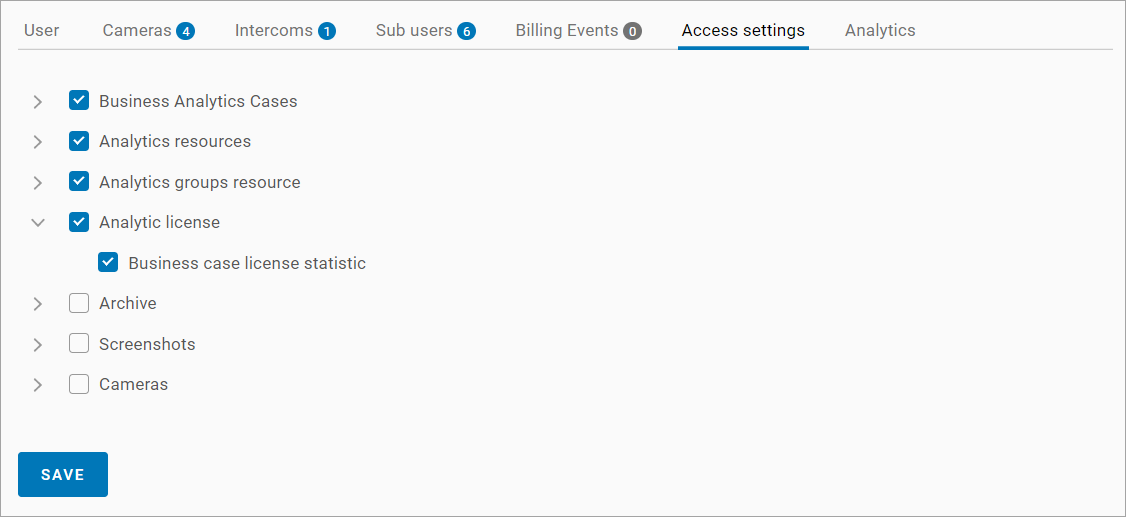
The Access settings tab
After making changes, click the Save button.
The Analytics tab
The Analytics tab is available if the user has licenses.

The Analytics tab
The tab displays a table with the following fields:
Video analytics level.
Total number of licenses – the total allocated licenses.
Used number of licenses.
Free number of licenses – available licenses.
License usage is determined by the number of cameras assigned to an analytics type during its creation. For example, assigning two cameras consumes two licenses.
Upon removal of all analytics licenses of a specific level from a user, corresponding analytics cases and case events will no longer be visible in the user interfaces. However, these data are retained within the system. If, after seven days, the user remains without licenses of that level, the analytics cases and events are permanently deleted.
